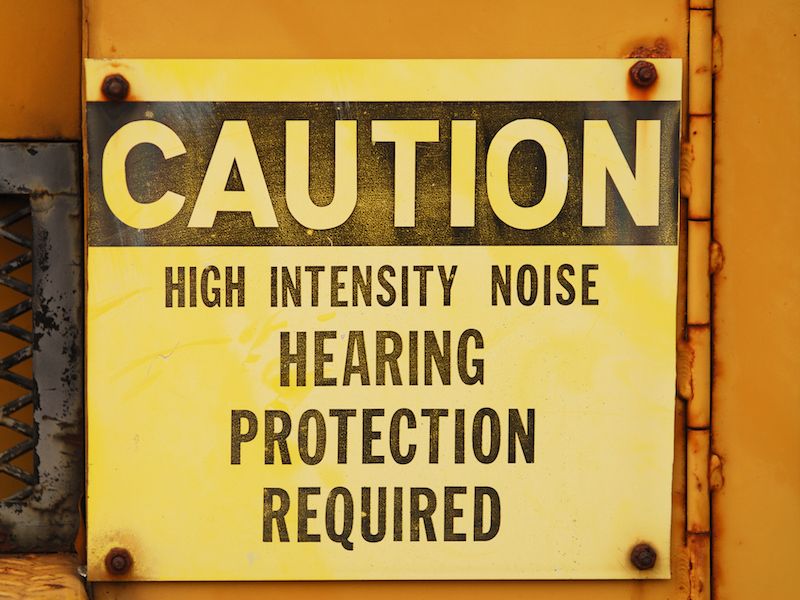
Realizing you should protect your ears is one thing. It’s a different story to know when to protect your ears. It’s more challenging than, let’s say, recognizing when you need sunblock. (Are you going to go outside? Is there sunlight? You should be wearing sunscreen.) It’s not even as simple as determining when to wear eye protection (Doing some hammering? Cutting some wood or working with dangerous chemicals? Wear eye protection).
When it comes to when to wear hearing protection, there seems to be a big grey area which can be risky. Unless we have particular information that some activity or place is hazardous we tend to take the easy path which is to avoid the issue entirely.
Assessing The Risks
In general, we’re not very good at assessing risk, especially when it comes to something as intangible as damage to the ears or the risk of long term sensorineural hearing loss. Here are some examples to demonstrate the situation:
- A very loud rock concert is attended by person A. 3 hours is about how long the concert lasts.
- A landscaping business is run by person B. She spends a considerable amount of time mowing lawns, then goes home to a quiet house and reads.
- Person C is an office worker.
You may think that person A (let’s call her Ann, to be a little less formal) may be in more hearing danger. Ann leaves the show with ringing ears, and she’ll spend most of the next day, struggling to hear herself talk. Presuming Ann’s activity was risky to her ears would be sensible.
The noise that person B (let’s just call her Betty), is exposed to is not as loud. Her ears don’t ring. So it must be less hazardous for her hearing, right? Not necessarily. Because Betty is mowing all day. So although her ears never ring out with pain, the injury builds up slowly. If experienced too often, even moderately loud noise can have a harmful affect on your ears.
Person C (let’s call her Chris) is even less obvious. The majority of people realize that you need to protect your hearing while running equipment such as a lawnmower. But although Chris has a relatively quiet job, her long morning commute through the city every day is fairly loud. In addition, she sits behind her desk and listens to music through earbuds. Is protection something she should consider?
When is it Time to Worry About Protecting Your Ears?
In general, you should turn down the volume if you have to shout to be heard. And if your surroundings are that loud, you should consider using earplugs or earmuffs.
If you want to think about this a bit more clinically, you need to use 85dB as your limit. Noises above 85dB have the potential, over time, to cause damage, so you need to give consideration to using ear protection in those scenarios.
Your ears don’t have a built-in sound level meter to warn you when you get to that 85dB level, so most hearing specialists suggest downloading special apps for your phone. You will be capable of taking the correct steps to protect your hearing because these apps will inform you when the sound is getting to a dangerous level.
A Few Examples
Your phone may not be with you wherever you go even if you do download the app. So a few examples of when to safeguard your ears may help you establish a good standard. Here we go:
- Every day Chores: We already mentioned how something as straightforward as mowing the lawn, when done frequently, can necessitate hearing protection. Chores, such as mowing, are probably something you don’t even think about, but they can result in hearing damage.
- Exercise: You know your morning spin class? Or perhaps your daily elliptical session. You may consider wearing hearing protection to each. The loud volume from trainers who use loud music and microphones for motivation, though it might be good for your heart rate, can be bad for your hearing.
- Listening to music with earbuds. OK, this doesn’t call for protection but does require caution. Whether your music is playing directly into your ears, how loud it is playing, and how long you’re listening to it are all things you should give consideration to. Think about using headphones that cancel out outside sound so you don’t have to crank up the volume to dangerous levels.
- Using Power Tools: You recognize that working every day at your factory job will necessitate ear protection. But how about the enthusiast building in his workshop? Even if it’s just a hobby, hearing specialists suggest wearing hearing protection if you’re operating power equipment.
- Driving & Commuting: Do you drive for Lyft or Uber? Or perhaps you’re just waiting downtown for work or boarding the subway. The noise of living in a city is bad enough for your ears, not to mention the added injury caused by turning up your music to drown out the city noise.
A good baseline might be established by these examples. When in doubt, however, you should defer to protection. Instead of leaving your ears exposed to future harm, in most cases, it’s better to protect your ears. Protect today, hear tomorrow.
